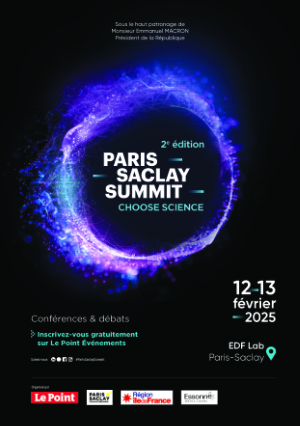L'aube de la formation planétaire // The dawn of planet formation
| ABG-126690 | Sujet de Thèse | |
| 06/11/2024 | Financement public/privé |
CEA Laboratoire de modélisation des plasmas astrophysiques
Saclay
L'aube de la formation planétaire // The dawn of planet formation
- Terre, univers, espace
- Physique
Astrophysique / Physique corpusculaire et cosmos
Description du sujet
La formation des planètes est un sujet phare de l’astrophysique avec des implications sur des questions existentielles comme l’origine de la vie dans l’Univers. De manière surprenante, nous ne savons pas précisément quand les planètes se forment au sein des disques protoplanétaires. De récentes observations semblent indiquer que ce processus pourrait se produire tôt dans l’évolution de ces disques. Mais les conditions qui règnent dans les disques jeunes sont encore méconnues. Au cours de cette thèse, nous proposons d’étudier l’hypothèse d’une formation rapide des planètes. Nous effectuerons des simulations 3D de formation des disques, incluant l’évolution du gaz, de la poussière ainsi que des mécanismes permettant de convertir les poussières en planétésimaux lorsque les conditions seront adéquates. En plus de déterminer si les planètes se forment rapidement ou non, nous pourrons étudier l’architecture des systèmes planétaires formés et la comparer aux systèmes d’exoplanètes observés. Ce travail, à la pointe de nos connaissances actuelles, s’inscrit dans de nombreux efforts de la communauté pour mieux comprendre les exoplanètes ainsi que nos origines.
------------------------------------------------------------------------------------------------------------------------------------------------------------------------
------------------------------------------------------------------------------------------------------------------------------------------------------------------------
Planet formation is a key topic of modern astrophysics with implications on existential questions such as the origin of life in the Universe. Quite surprisingly, we do not precisely know when and where planets are formed in protoplanetary disks. Recent observations however indicate that this might happen sooner than we previously believed. But the physical conditions in the young disks remain poorly constrained. During this thesis we propose to test the hypothesis that planets could form early. We will perform 3D simulations of protoplanetary disk formation with gas, dust and including the mechanisms of planetesimal formation. In addition from determining whether planets form early we will be able to predict the architectures of exoplanet systems and to compare them to real ones. This work, beyond the current state-of-the-art, is timely as many efforts are currently being done by our community to better understand exoplanets as well as our origins.
------------------------------------------------------------------------------------------------------------------------------------------------------------------------
------------------------------------------------------------------------------------------------------------------------------------------------------------------------
Pôle fr : Direction de la Recherche Fondamentale
Département : Institut de recherche sur les lois fondamentales de l’univers
Service : Direction d’Astrophysique
Laboratoire : Laboratoire de modélisation des plasmas astrophysiques
Date de début souhaitée : 01-10-2025
Directeur de thèse : Hennebelle Patrick
Organisme : CEA
Laboratoire : DRF/IRFU/DAP/LMPA
URL : https://ulebreui.github.io/
URL : https://irfu.cea.fr/Phocea/Vie_des_labos/Ast/ast_groupe.php?id_groupe=1250
------------------------------------------------------------------------------------------------------------------------------------------------------------------------
------------------------------------------------------------------------------------------------------------------------------------------------------------------------
Planet formation is a key topic of modern astrophysics with implications on existential questions such as the origin of life in the Universe. Quite surprisingly, we do not precisely know when and where planets are formed in protoplanetary disks. Recent observations however indicate that this might happen sooner than we previously believed. But the physical conditions in the young disks remain poorly constrained. During this thesis we propose to test the hypothesis that planets could form early. We will perform 3D simulations of protoplanetary disk formation with gas, dust and including the mechanisms of planetesimal formation. In addition from determining whether planets form early we will be able to predict the architectures of exoplanet systems and to compare them to real ones. This work, beyond the current state-of-the-art, is timely as many efforts are currently being done by our community to better understand exoplanets as well as our origins.
------------------------------------------------------------------------------------------------------------------------------------------------------------------------
------------------------------------------------------------------------------------------------------------------------------------------------------------------------
Pôle fr : Direction de la Recherche Fondamentale
Département : Institut de recherche sur les lois fondamentales de l’univers
Service : Direction d’Astrophysique
Laboratoire : Laboratoire de modélisation des plasmas astrophysiques
Date de début souhaitée : 01-10-2025
Directeur de thèse : Hennebelle Patrick
Organisme : CEA
Laboratoire : DRF/IRFU/DAP/LMPA
URL : https://ulebreui.github.io/
URL : https://irfu.cea.fr/Phocea/Vie_des_labos/Ast/ast_groupe.php?id_groupe=1250
Nature du financement
Financement public/privé
Précisions sur le financement
Présentation établissement et labo d'accueil
CEA Laboratoire de modélisation des plasmas astrophysiques
Pôle fr : Direction de la Recherche Fondamentale
Département : Institut de recherche sur les lois fondamentales de l’univers
Service : Direction d’Astrophysique
Profil du candidat
Magnétohydrodynamique, modélisation, calcul analytique
Postuler
Fermer
Vous avez déjà un compte ?
Nouvel utilisateur ?
Besoin d'informations sur l'ABG ?
Vous souhaitez recevoir nos infolettres ?
Découvrez nos adhérents
 ADEME
ADEME  CESI
CESI  Institut de Radioprotection et de Sureté Nucléaire - IRSN - Siège
Institut de Radioprotection et de Sureté Nucléaire - IRSN - Siège  MabDesign
MabDesign  PhDOOC
PhDOOC  Institut Sup'biotech de Paris
Institut Sup'biotech de Paris  TotalEnergies
TotalEnergies  ANRT
ANRT  Nokia Bell Labs France
Nokia Bell Labs France  Aérocentre, Pôle d'excellence régional
Aérocentre, Pôle d'excellence régional  Généthon
Généthon  Groupe AFNOR - Association française de normalisation
Groupe AFNOR - Association française de normalisation  Tecknowmetrix
Tecknowmetrix  SUEZ
SUEZ  MabDesign
MabDesign  CASDEN
CASDEN  Ifremer
Ifremer  Laboratoire National de Métrologie et d'Essais - LNE
Laboratoire National de Métrologie et d'Essais - LNE  ONERA - The French Aerospace Lab
ONERA - The French Aerospace Lab




